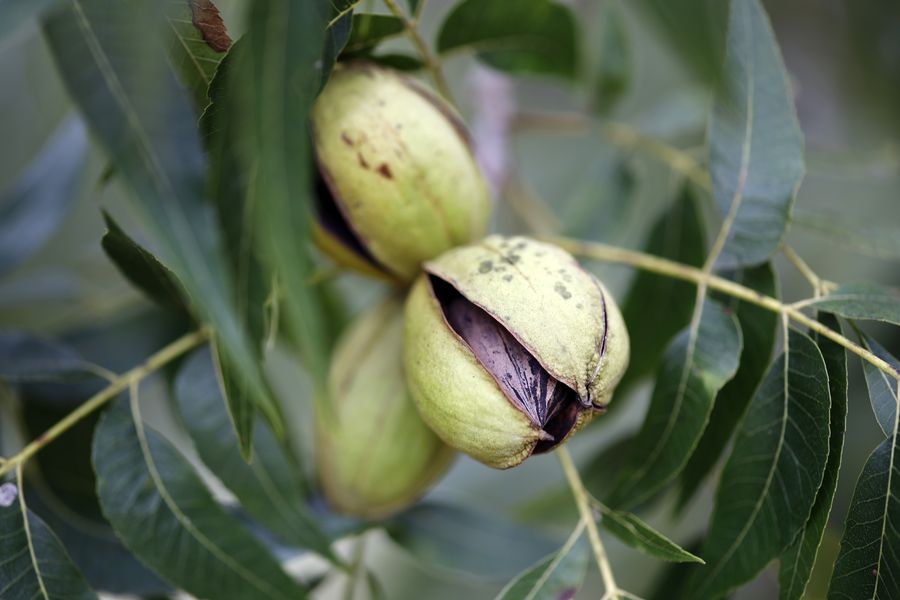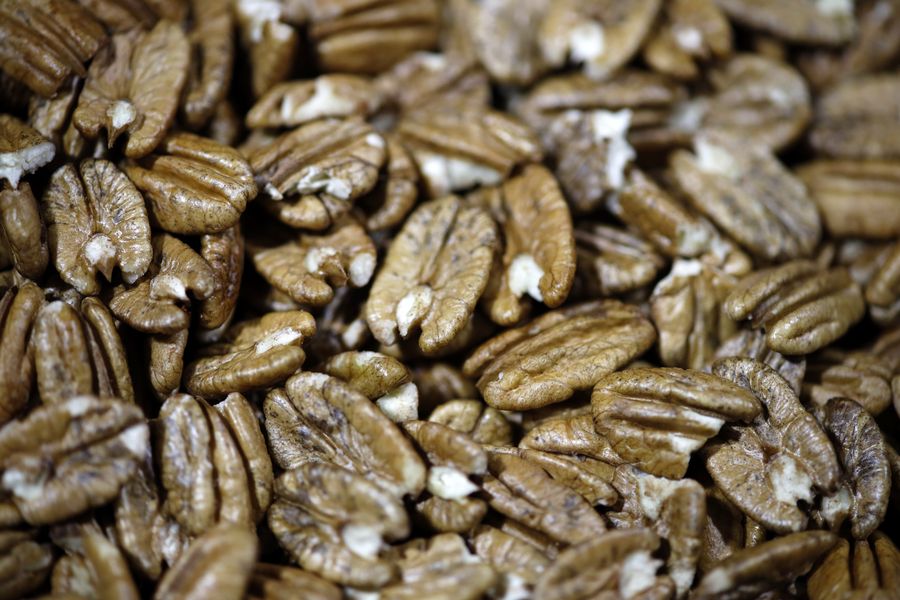
Janice Dees, executive director and international marketing manager of U.S. Pecan Growers Council, speaks during an interview with Xinhua in Tifton, Georgia, the United States, Oct. 25, 2019. (Xinhua/Li Muzi)
Before U.S.-China trade ties soured in 2018 due to US-initiated trade disputes, China was the biggest overseas consumer of U.S. pecans. The sudden drop in the demand dragged down pecan prices by about 40 percent.
VIENNA, the United States, Oct. 31 (Xinhua) -- U.S. pecan growers are now looking to sell their products directly to Chinese consumers through e-commerce platforms in hopes that demand could pick up despite the presence of high tariffs.
Ellis Bros. Pecans Inc., a well-known pecan grower, processor and retailer located in Vienna city in the southeast U.S. state of Georgia, has been working for more than one and a half years under the Georgia Grown project to sell its packaged shelled pecans on China's e-commerce platform JD.com.

People shop in a store of Ellis Bros. Pecans Inc., in Vienna, Georgia, the United States, Oct. 25, 2019. (Xinhua/Li Muzi)
About 95 percent of Ellis Bros. Pecans' revenues come from domestic consumers, but the company is now considering expanding its business in overseas markets.
Pecan growers in Georgia had a tough year in 2018 as they took a blow from Hurricane Michael as well as increased tariffs to enter the Chinese market.

Pecans are pictured in an orchard near Cordele, Georgia, the United States, Oct. 26, 2019. (Xinhua/Li Muzi)
The output of pecan in the state of Georgia, which was the largest producer of the tree nut for quite a few years, was roughly halved in 2018 due to impacts of Hurricane Michael, said Janice Dees, executive director and international marketing manager of the U.S. Pecan Growers Council.
Ellis Bros. farms about 3,000 acres (1,214 hectares) of pecan. It lost about 4,000 pecan trees from the hurricane, which roughly translates into 170 acres to 210 acres (68.8 hectares to 85 hectares) of pecan acreage, according to Slade Ellis, a member of the family-run business.
In addition, U.S. pecan exports to China is subject to roughly 47 percent tariff, up from 7 percent in early 2018, according to the Pecan Report, a publication covering the global pecan market.
As a result, Chinese imports of U.S. pecans paused. Before U.S.-China trade ties soured in 2018 due to US-initiated trade disputes, China was the biggest overseas consumer of U.S. pecans. The sudden drop in the demand dragged down pecan prices by about 40 percent.
With the help of the Georgia Grown project, a marketing and economic development program by the Georgia Department of Agriculture, Ellis Bros. and two other brands are now able to sell about 20 products to Chinese consumers, including flavors of sea salt, habanero BBQ, maple and cajun, among others.

Pecans are pictured at Hudson Pecan Company in Ocilla, Georgia, the United States, Oct. 24, 2019. (Xinhua/Li Muzi)
The online store's page offers a detailed introduction to the pecan, including how to grow it, its processing procedure, and its healthy benefits. The page also includes an introduction to the Georgia Pecan Growers Association, which helps support growers in all aspects of marketing and education.
Shaina Stillwell from Ellis Bros. is deeply involved in the company's operations on JD.com. She told Xinhua that by working on the project, she learned a lot about what flavors Chinese consumers like.
"We learned that Chinese consumers like spicy (snacks) ... We are trying to introduce more flavors to them in addition to the natural and roasted pecan halves," she said.
Suffice it to say that the pecan industry in Georgia has spared no efforts in winning the Chinese market and maintaining contact with Chinese buyers even at a time when Chinese importers are switching to other pecan growing countries like Mexico.
Samantha McLeod, executive director of the Georgia Pecan Growers Association, said that a lot of pecan growers still have good relations with their Chinese partners and are waiting for tariffs to be lifted.
Dees said the industry itself hopes that pecans are part of what is known as the phase-one trade deal between China and the United States.
She said the U.S. pecan industry attaches importance to China. "We look forward to going back to doing business very soon."
According to Dees, some U.S. states like Georgia, North Carolina, South Carolina, Tennessee and Alabama export most of their pecans to China. ■



